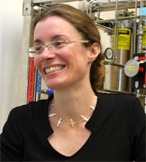Sustainability
is one of the major challenges facing modern society, and modern
chemistry. Merely to maintain current standards of living, we must
learn
to do more with less: we must husband our resources; we must curb our
profligate use of energy and fossil reserves; and we must learn better
how to transform wastes into commodities. My research in molecular
catalysis is directed at the discovery of energy- and resource-frugal
ways to build the molecules and materials that enable the advanced
technologies of the 21st century. A snapshot of selected projects and
publications
appears below.
Olefin Metathesis
Olefin metathesis is one of the
most powerful methods in current use for the construction of new
carbon-carbon bonds. However, 25 years after the discovery of "robust"
metathesis catalysts based on ruthenium (the breakthrough discovery
that resulted in real-world use of the methodology by organic
chemists), and more than a decade after the Nobel Prize for olefin metathesis,
industrial applications in organic synthesis remain astonishingly
limited. Our work in this highly competitive area has focused on
understanding the factors that limit selectivity in ring-closing
metathesis (RCM, one of the major synthetic applications of the
methodology) and cross-metathesis (CM(, in delineating the parameters that
limit the lifetimes of the dominant ruthenium catalysts, and using
these insights to develop new methodologies or catalysts to aid
industrial uptake. Collaborative work includes a "mechanistic
engineering" approach to implementation of RCM in industrial flow
chemistry, and new opportunities in sustainable
metathesis (see next).
Metathesis and
Sustainability
Metathesis is likely to emerge as core technology for sustainable
practices in the coming decade. With a 30% cut in fossil-fuel
dependence by 2021 targeted as a US national-security goal, Canadian
"waste" biomass represents a strategic resource that can be tapped via
forefront methodologies in olefin metathesis. Likewise abundant, and in
some cases more accessible, resources are found in tropical oils.
Brazil, a Canadian federal-priority partner, has unsurpassed
potential to contribute to high-value renewables
through olefin metathesis, and to augment these via tandem
catalysis, an area in which my group has made leading contributions.
Collaborative work with Brazilian researchers (Minas Gerais,
Rio de Janeiro) centers on these opportunities, and on producing
highly-trained graduates with the skills to mobilize this enormous
potential.


